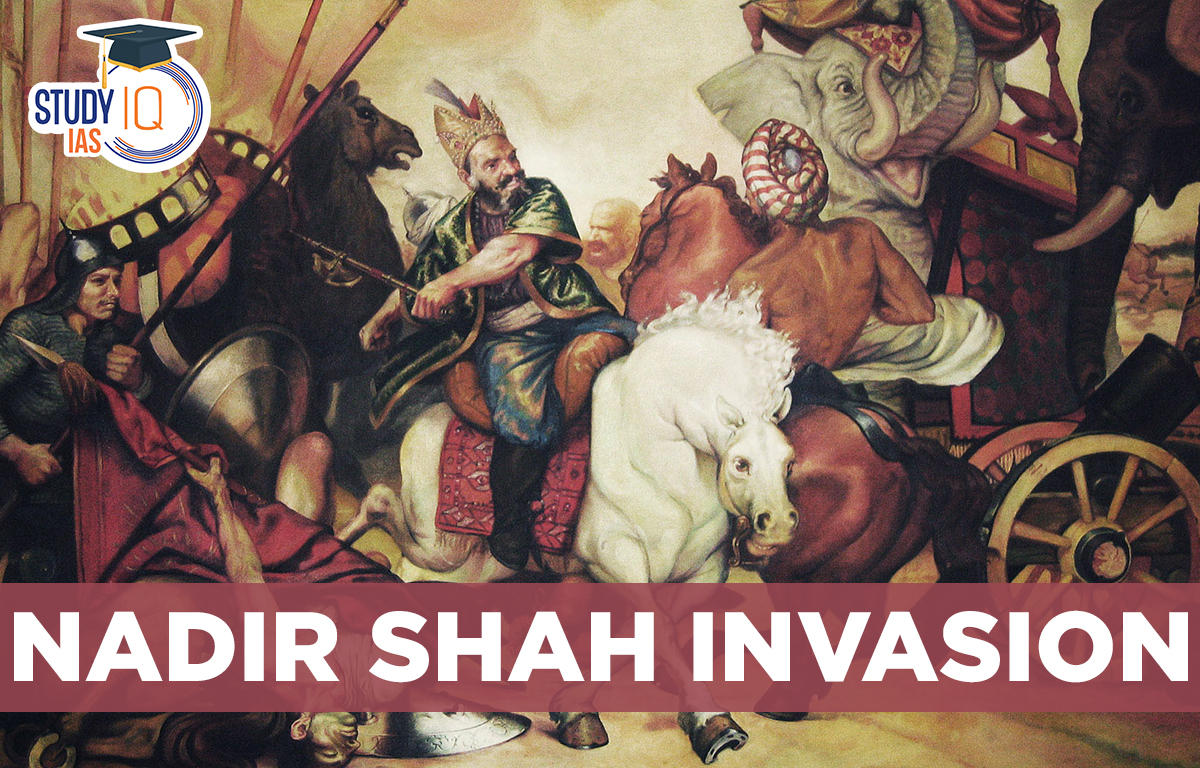Table of Contents
Nadir Shah Invasion
Read all about Nadir Shah Invasion. One of the most powerful kings in Iranian history, Nadir Shah Afshar established the Afsharid dynasty and ruled Iran (Persia) as shah from 1736 until his assassination in 1747 as a result of a rebellion. Invading India in 1738–1739, the Persian king Nadir Shah took Lahore and, on February 13 of that year, defeated the Mughal army at Karnal. You will learn about Nadir Shah in this article, which will help students with the preparation for the UPSC Civil Service Exam.
Nadir Shah Invasion History
The Iranian Afsharid dynasty of Persia was founded by the Shah of Persia Nadir Shah (1736–47), who also conquered Northern India before finally conquering Delhi in March 1739. In the War of Karnal, his army easily defeated the Mughals, and as a result, it later took control of the Mughal capital. None of Aurangzeb’s successors were able to fill the void that his passing left in the Mughal Empire.
Due to ongoing struggles for the throne and the deceit of ministers, the empire had grown weaker. The weak realm presented a chance for Nadir Shah, a dacoit who ascended through the ranks to rule Persia. In 1738, Nadir Shah then attacked India. Because Mughal Emperor Muhammad Shah insulted the Persian ambassador at Delhi’s royal court, the invasion was legitimate.
He invaded the western frontiers of the Mughal Empire in 1739, capturing Ghazni, Kabul, and Lahore. The Governor of Punjab pleaded with the Mughal Empire to strengthen Punjab’s defenses before Nadir Shah reached the Khyber Pass, but Muhammad Shah, the reigning Mughal emperor, dismissed him.
Muhammad Shah, sensing a threat shortly after Nadir Shah entered Punjab, dispatched Khan Dauran and Nizam-ul-Mulk to lead the Mughal army against Nadir Shah. But once both were overpowered, Muhammad Shah was driven to assume command of the army by himself.
At Karnal, when the two armies battled, the Mughal forces were quickly surrounded and defeated. Khan Dauran suffered serious injuries, and Saadat Khan, the Nawab of Awadh, was seized. The Mughal army was in disarray after its defeat. By acting as a middleman, The Nizam convinced Nadir Shah to go back to Persia in exchange for 20 million rupees.
Nizam impressed the Mughal emperor, who gave him the title of “Amir-Ul-Umra” and made him prime minister. Nadir Khan was admonished by Saadat Khan not to settle for anything less than what even a provincial governor might be able to provide him. The Persian monarch was electrified by this, and Delhi’s splendour suddenly appeared before his eyes.
Nadir Shah Invasion in India and Massacre Caused
The triumphant Nadir Shah followed the bowed Mughal Emperor into Delhi. Keys to the Delhi fort’s treasure and wealth had already been given. A monetary sum was also agreed upon with Nadir Shah as a prerequisite for his return. Nevertheless, word got out that Nadir Shah had been killed. In Delhi, riots broke out, and a few Persian soldiers were killed.
Nadir Shah instantly rode towards the city after learning of this to find dead Persian warriors lying on the streets. At the Sunhari masjid of Roshnuddola, several individuals threw stones at him, and a stray bullet killed a Persian soldier. He was so furious that he gave the order to execute a large number of people everywhere where Persian military relics had been found.
Delhi’s citizens were thus pillaged and slaughtered on March 11, 1739; some historians calculate that close to 0.2 million people perished.
Nadir Shah Invasion Consequences
The entire city of Delhi was destroyed, pillaged, looted, and ruined by Nadir Shah’s troops. The Peacock throne built by Shah Jahan was transported by Nadir Shah. The legendary “Koh-i-noor” diamond was also taken by him. He also stole 600 million rupees’ worth of jeweler, 10 million rupees’ worth of gold, and 6 million rupees’ worth of cash.
His entire collection, which he brought to Persia after invading India, was estimated to be worth 700 million rupees. This collection included 7000 artisans, 200 carpenters, 100 stone-cutters, and thousands of elephants, horses, and camels. The Nadir Shah Invasion of India, the first of its kind in Indian history, was a clear illustration of the harshness and severe treatment meted out to the citizens of the city.
The destruction at Delhi left the Mughals so helpless that they were unable to face other enemies or regain their strength. The damage this invasion did to the Mughal Empire was disastrous. Mughal lands were seized by the Persians. Between 1748 and 1767, Ahmad Shah Abdali repeatedly invaded India and attacked Delhi, following in Nadir Shah’s footsteps.
Nadir Shah Invasion and Damage on Mughal Empire
The Mughal Empire suffered severe devastation as a result of Nadir Shah’s assault. The Maratha sardars and the foreign commercial corporations were made aware of the Mughal Empire’s covert weakness, which resulted in an irreversible loss of prestige. The invasion destroyed imperial finances and negatively impacted the nation’s economy.
In an effort to regain their lost money, the poor nobles started to rack-rent and abuse the peasantry further. Additionally, they fought more vehemently than ever over expensive jagirs and prestigious positions. The Empire was once more exposed to the possibility of attack from the North-West after losing Kabul and the territories to the west of the Indus. A crucial line of defense was cut off (North Western defense of Mughal Empire).
Nadir Shah Invasion UPSC
Nadir Shah’s attack caused permanent harm to the Mughal Empire. The Persians received Mughal territory on both banks of the Indus. Nadir Shah’s mischief later inspired his successor Ahmad Shah Abdali, who between 1748 and 1767 invaded India four times and pillaged Delhi. Complete information on Nadir Shah Invasion for UPSC Exam Preparation is provided in this post.





















 WhatsApp
WhatsApp